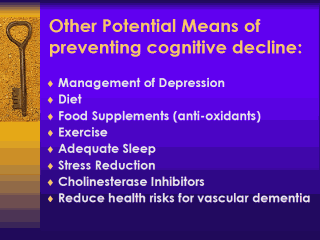| front |1 |2 |3 |4 |5 |6 |7 |8 |9 |10 |11 |12 |13 |14 |15 |16 |17 |18 |19 |20 |21 |22 |23 |24 |25 |26 |27 |28 |29 |30 |31 |32 |33 |34 |35 |36 |37 |38 |39 |40 |41 |42 |43 |44 |review |
 |
Dr. Mike Pramuka: My focus is only going to
be on mental activities or physical fitness. Some kind of thing that we can do as opposed
to the many other things that might change aging and cognition. Just to kind of
acknowledge some of those other things that are out there. We know that management of depression can have a tremendous impact on people’s ability to think and perform in everyday life as they age. Diet is very important. Food supplements, I’m not sure if they’re important or not but certainly there’s a lot of discussion and literature talking about the use of antioxidants as a way to minimize cognitive decline in aging. Exercise. I’ll let the experts speak for themselves. Exercise is critical to healthy aging in general. Adequate sleep. Something that I often preach to individuals that I meet with to look at carefully as a basic tool for making sure that people are making the best use of their cognitive abilities. Stress reduction has long been a tool we’ve used in psychology and in mental and behavior health to assist people in making the best use of what they’ve got. Cholinesterase inhibitors, Aricept, Exelon and medications like that. They have got a lot of use and a lot of attention in recent years and in general reducing health risks for vascular dementia. All these things are potential means that we have at hand that might prevent decline as people age. I’m not going to talk about any of them. They are each a lecture in themselves I think. |